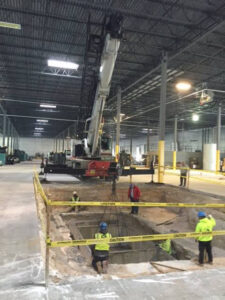Prevent Worksite Accidents with These Crane Safety Tips
Tips to Prevent Worksite Accidents
Worksite accidents involving cranes can have severe consequences, leading to injuries, fatalities, and significant financial losses. If you don’t want to expose your project, company, property, and employees to risk, you will want to make safety your top priority. With the right safety strategies, you can reduce the risk of crane accidents. With a focus on crane operator safety, equipment knowledge, proper maintenance, and effective communication, your project can be a success. The following considerations can help make sure you project stays on track and free from disaster.

Thoroughly Read All of the Operator’s Manuals
A fundamental step in preventing crane accidents is ensuring that crane operators have a comprehensive understanding of the equipment they are working with. Thoroughly reading and familiarizing themselves with all operator’s manuals is essential. These manuals provide critical information about the crane’s specifications, limitations, and safety guidelines. Operators must be well-versed in the manufacturer’s recommendations to operate the crane efficiently and safely.
Safety Mechanism
Modern cranes come equipped with advanced safety mechanisms designed to prevent accidents. Operators should have a deep understanding of these safety features and ensure they are functioning correctly before each operation. This includes checking emergency brakes, overload protection systems, and other safety devices that contribute to accident prevention. Regular maintenance and testing of safety mechanisms should be a standard part of crane operation procedures.
Only Hire Qualified Operators
Whatever the size of your crane project, you will need operators who have undergone proper training and certification. Crane operators should possess the necessary licenses and certifications, demonstrating their ability to operate specific types of cranes safely. Regular training programs and continuing education initiatives can further enhance the skills of crane operators, keeping them up to date with the latest safety practices. At L.R. Willson & Sons, we cultivate a secure work environment for our crew by administering safety training classes, practicing on-site hazard management, and closely adhering to all safety standards. We also ensure that these standards remain up to date considering the latest qualifications and procedures for in-house and on-site safety.
Choosing the Perfect Crane for Your Project
Selecting the right crane for a particular project is crucial in preventing accidents. Different projects require different types of cranes based on factors such as load capacity, reach, and terrain. Before commencing any operation, careful consideration should be given to the specific requirements of the project, and the crane chosen should align with these needs. Choosing an appropriately sized and configured crane helps optimize safety and operational efficiency. If you’re unsure about what crane you need for your project, contact us today. With our extensive inventory of cranes ranging from 23 to 440 tons, we can recommend the rigging best suited for your project.
Stabilize the Crane Before Rigging It
One of the leading causes of crane accidents is instability during operation. To prevent this, operators must ensure that the crane is properly stabilized before rigging. This involves deploying outriggers or other stabilizing mechanisms according to the manufacturer’s guidelines. Ignoring this step can result in tip-overs or structural failures, posing significant risks to both personnel and equipment.
Keep the Crane Clear of Obstacles When Moving
During crane movement, it is essential to maintain a clear path and eliminate potential obstacles. Operators should be vigilant about the crane’s surroundings, ensuring there are no overhead power lines, buildings, or other structures that may pose a hazard. Clear communication between the operator and ground personnel is vital in identifying and avoiding potential obstacles. Implementing a comprehensive pre-operational checklist can help ensure that the area is safe for crane movement.
Communicate Clearly at All Times
Effective communication is the cornerstone of crane safety. Clear and concise communication between crane operators and other onsite personnel is crucial for accident prevention. Use standardized hand signals or radio communication systems to convey instructions accurately. Establishing a communication protocol that prioritizes clarity and precision will reduce the risk of misunderstandings or errors during crane operations.
Go Through Operator Checks Every Day
Routine checks and inspections are essential for identifying potential issues before they escalate into safety hazards. Crane operators should perform thorough pre-operational checks every day, examining components such as cables, hooks, and hydraulics. Any signs of wear, damage, or malfunction should be addressed promptly through maintenance or repair. Implementing a daily checklist ensures that operators systematically assess the crane’s condition, contributing to a safer working environment.
Preventing worksite crane accidents requires a comprehensive approach. This is why you should trust your crane project to the professionals at contact L.R. Willson & Sons Crane Rental. With over 50 years of experience, an extensive fleet of cranes, and over 150 dedicated employees, we have the tools and expertise to help you get the job done right. Our attention to safety and efficiency have earned us certifications from the American Institute of Steel Construction and the Precast Concrete Institute, as well as endorsement from the National Commission for the Certification of Crane Operators. We provide service to Washington, Annapolis, Baltimore, Northern Virginia, and the surrounding areas. Call us today at 410-695-3967 for a free project estimate.
““
